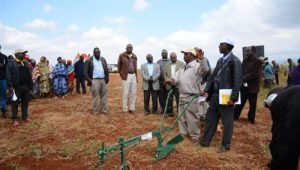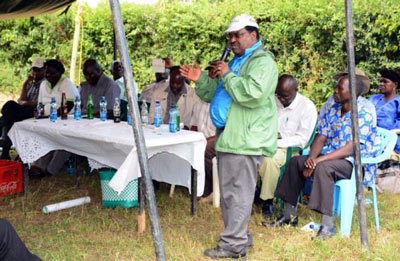
SIMLESA Field Days Nudge East African Farmers towards Sustainable Intensification
Smallholder farmers in East Africa can attain food security and move from subsistence to commercial farming by sustainably intensifying their maize-based farming systems. This was revealed during the annual field days recently held in Kenya and Tanzania, which were jointly organized by CIMMYT’s Sustainable Intensification of Maize-Legume Cropping Systems for Food Security in Eastern and Southern Africa (SIMLESA) project and the two countries’ national research systems.
The objective of the field days was to examine how the new experiments under SIMLESA Phase II were progressing and gather farmers’ feedback on some of the sustainable intensification interventions. They also showcased SIMLESA’s farmer-tested improved maize-legume technologies.
Smallholder farmers interacted with NGOs and private-sector partners who have shown great interest in SIMLESA’s outscaling approach, which relies on lead farmers and uses demonstration sites as learning centers. Some of the sites promote smallholder agriculture development by linking farmers with buyers and agridealers, and helping them access credit and technical training.

In Tanzania, the field day was held on July 16 in Karatu District, with the participation of more than 300 people, including senior government officials. Highlighted during the field day were a newly released drought tolerant maize hybrid (TZH 538), a newly released bean variety (JESCA), proper maize and bean intercropping practices, and farm mechanization equipment, especially direct seeders, jab planters and rippers.
In neighboring Kenya, during the field day held in Meru County on July 21, SIMLESA’s technologies were included in a mega-demonstration plot where SIMLESA partners in eastern Kenya promote conservation agriculture (CA) technologies at the smallholder farm level. All activities are carried out by members of the area’s agricultural innovation platform (AIP) through which SIMLESA farmer groups, the Kenya Agriculture and Livestock Research Organization, and relevant stakeholders share agricultural information and knowledge.
AIP in SIMLESA refers to a network of actors along a value chain with aligned objectives and activities to sustainably generate and share information, and knowledge on agribusiness and other agricultural development work.
The field day in Boro, Siaya County, western Kenya, was organized by the Boro Agricultural Innovation Platform on 22 July. It presented agricultural technologies such as maize-groundnut rotations and maize-pigeonpea systems being implemented by lead farmers and adopted by over 2,000 farmers. In this area, new maize and groundnut varieties have been introduced under SIMLESA Phase II, in addition to common bean varieties that were previously tested in core on-farm exploratory trials.

Speaking at the field day at Boro, SIMLESA Project Leader Mulugetta Mekuria said the debate on whether CA works or not was no longer an issue. “The bottom line is that smallholder farmers should move from subsistence to commercial farming. To achieve this, more work is needed to improve seed systems in Africa by encouraging local research institutes and locally-owned African seed companies, and installing mechanisms to reach farmers with improved seeds.” He also stressed the urgent need to work with smallholder farmers to maximize crop yields and improve their land through more efficient use of fertilizers and herbicides, and better post-harvest processing and storage facilities.
Helping family farmers diversify what they grow to ensure a nutritionally diverse diet and protect their farming income from the risks of climate change, was also another key message.
Other main “take home” messages from the field days included:
- Strengthening national and local institutions
- Building the technical and knowledge infrastructure for sustainable farming
- Improving financial investment in agriculture
- Improving access for “innovative” private investors, such as microfinance